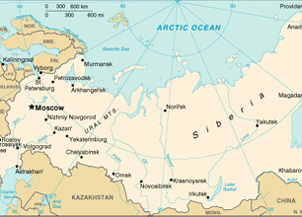It’s been more than a decade since the former Soviet Union went from a socialist to a democratic form of government. Halfway around the world, people in Omaha and Kearney are helping strengthen Russia’s infrastructure to include promoting better health for Russian citizens.
Eight Russian nurse leaders will spend almost a week in Nebraska as part of the Open World Program of the Center for Russian Leadership Development at the United States Library of Congress. Sheila Ryan, Ph.D., UNMC College of Nursing professor Charlotte Peck Lienemann & Alumni Distinguished Chair, is spearheading the Oct. 16-23 visit. The nurses will learn how nursing and civic organizations can work together to improve health policy.
Dr. Ryan got involved in the project as a board member of the American International Healthcare Alliance.
Omaha is one of five sites in the United States to host the Russian nurse leaders. During their visit, they’ll learn about the American process of health policy, nurse training and education, professional development and association-building. The Russians coming to Nebraska are from Samara, in western Russia, located about 400 miles southeast of Moscow.
Before arriving in Nebraska, the nurse leaders will spend two days in Washington, D.C., to learn about American culture and nursing leadership. While in Nebraska, the nurse managers will spend time learning about local and national nursing associations and about the role of nurses in the United States. They also will tour health-care facilities, including hospitals and community health-care facilities, alcohol and drug treatment facilities, school-based health programs and mental health facilities.
The weekend will be spent learning about the local economy, touring cultural sites and spending time with their host families.
Developing leaders
The Open World Program of the Center for Russian Leadership Development has provided more than 3,600 young Russian leaders — a third of them women — a hands-on introduction to the institutions and practices of American-style democracy and free enterprise.
The experience is intended to assist Russian leaders in building a strong civil society. The visit encourages women to expand their leadership potential. One of the goals of the program is building the capacity necessary for Russian communities to provide comprehensive, accessible healthcare services to their citizens.
Dr. Ryan, colleagues and Nebraskans not only will share their knowledge in Omaha and Kearney, but also their homes. Six nurses will stay in Omaha and two in Kearney, hosted by Kate Nickel, Ph.D., assistant professor, UNMC College of Nursing Kearney Division. Translators will facilitate communication.
“I’m excited because I love the international exchange,” Dr. Nickel said. “The opportunity gives one the chance to suspend disbelief and learn. There’s nothing like it.”
Sharing knowledge, information
Dr. Ryan said the focus of the visit is on leadership, nursing education and practice, and how civic and health services organizations and policy can work together to improve the health of communities. “After the dissolve of the former socialist state in Moscow, the government has gone from a highly centralized government, to a decentralized one, with each community taking control of its own infrastructure,” Dr. Ryan said.
“We want to share the benefits of integrating their health, education and local government components to benefit the community,” she said. “We also want to share what we know about the linkages and using policy to mobilize and influence better funding for health programs in the community.”
Valuable experience for UNMC
Dr. Ryan said the experience also would be valuable to UNMC.
“We’re proud to have been selected as a site for Russian nurses to learn about leadership and civic and organizational influence to improve health care,” Dr. Ryan said. “Most importantly, it helps those of us living in Nebraska realize first hand that we are citizens in a global community with responsibilities to respect, learn from and offer assistance to one another.”
During the visit, Russian nurse managers will meet with city and county health officials, as well as observe nurse practitioners and community health nurses – roles common in the United States, but not in Russia. They also will learn about nursing education, distance-nursing education, nursing scholarship, and how to publish journals and apply for grants.
“Women play an integral role in efforts to build a civil society,” Dr. Ryan said. “Their professional organizations are new; we have much to share about how they can influence health and educational policy, patient care standards and health outcome in communities.”
Who is involved
Other organizations participating in the exchange are Sigma Theta Tau International, the American Organization of Nurse Executives, the International Council of Nurses and the nursing unit of the World Health Organization (WHO).
The visiting nurse leaders are: Tatyana Ovsyannikova, chief feldsher of City Ambulance Station; Julia Radchenko, faculty, Samara Medical College; Valentina Trunova, vice president of Samara Oblast Nurses Association and deputy chief physician on nursing, Samara-Polyclinic #2; Natalya Muromskaya, chief Nurse, City Hospital #2, chief nursing specialist of Togliatti City; Elena Kuznetsova, head nurse medical – Sanitary Unit #5; Oksana Penzina, chief nurse of Samara State University Clinics; Nadezhda Shakirzyanova, chief nurse of Sergievsk Central Regional Hospital and Lyudmila Lazereva, nursing chair assistant, Samara State University.